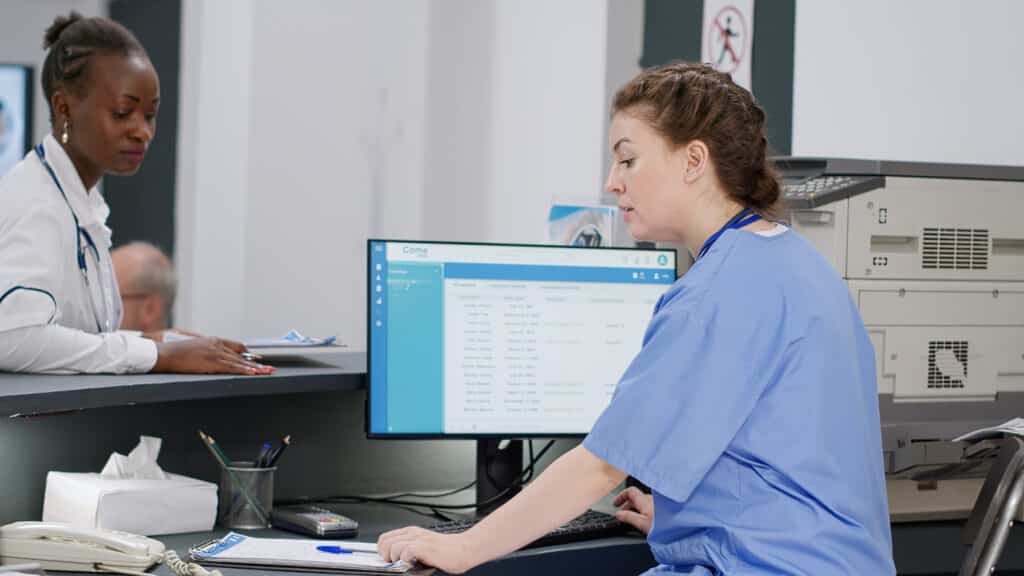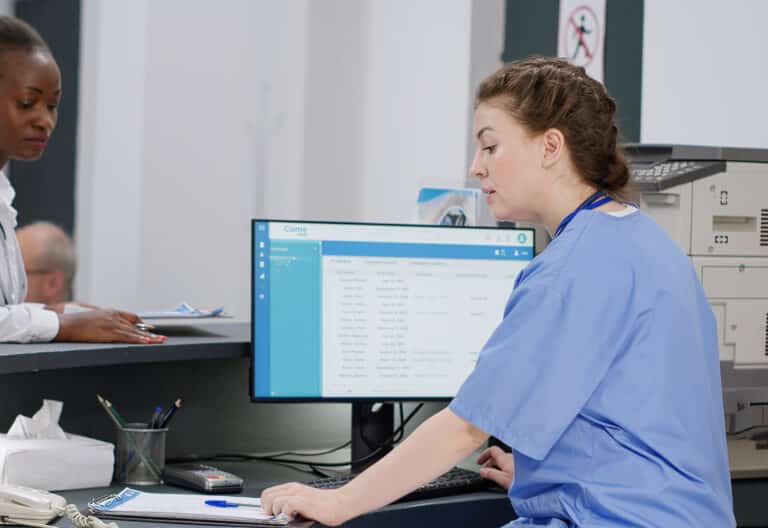If you want to start a career in healthcare but aren’t quite confident about patient care, then becoming a Medical Records Specialist could be a great option.
This role enables you to work in the healthcare industry without performing direct medical procedures, instead focusing on managing and organizing essential patient information.
Their expertise in medical coding, data entry, and electronic health records management helps streamline operations and improve patient care behind the scenes.
In this article, we’ll explore who Medical Records Specialists are, what they do, the skills required, different job titles they may hold, where they work, salary expectations, and much more.
So, let’s get started.

Who Are Medical Records Specialists?
Unlike clinical healthcare workers, such as medical assistants, Medical Records Specialists do not provide direct patient care. Instead, they focus on the administrative and technical aspects of healthcare.
They are healthcare professionals responsible for managing and maintaining patient records. They ensure that all medical documents, including patient histories, diagnoses, treatment plans, and billing information, are accurately recorded, organized, and securely stored.
They work extensively with Electronic Health Records (EHR) systems, medical coding, and insurance billing, helping to process claims and ensure timely reimbursements.
Their role is essential in keeping healthcare facilities compliant with industry regulations such as HIPAA (Health Insurance Portability and Accountability Act) and ensuring smooth operations in medical offices, hospitals, and other healthcare settings.
Popular Job Titles for Medical Records Specialists
Many popular job titles fall under the broader category of Medical Records Specialists.
- Medical Records Specialist
- Electronic Health Records Specialist
- Medical Records Technician
- Medical Records Clerk
- Medical Records Coordinator
However, some titles, like Medical Billing Specialists and Medical Billers, are more focused on the billing side rather than strictly handling medical records.
Where Medical Records Specialists Work?
According to the BLS, in 2023, there were approximately 191,500 Medical Records Specialists professionals working across various healthcare and administrative settings.
Here’s where they worked:
- Hospitals – 28%
- Physicians’ Offices – 19%
- Management of companies and enterprises – 9%
- Professional, scientific, and technical services – 8%
- Administrative and support services – 8%
What Do Medical Records Specialists Do?
Medical Records Specialists ensure that medical facilities run smoothly, patient data is accurate, and healthcare providers have the information they need for effective treatment.
Here are the main Duties of Medical Records Specialists:
#1 Review Patients’ Records for Timeliness, Completeness, and Accuracy
Medical Records Specialists ensure that all patient records are accurate, complete, and up to date. This involves verifying that doctors have properly documented diagnoses, treatments, and test results.
For example, if a patient undergoes a lab test, the specialist checks that the results are recorded correctly and that no information is missing. This prevents errors and ensures healthcare providers have reliable data when making medical decisions.
#2 Use Classification Systems to Assign Clinical Codes
Every medical procedure, diagnosis, and treatment needs to be coded using standardized classification systems like ICD (International Classification of Diseases) and CPT (Current Procedural Terminology).
Medical Records Specialists assign the correct codes to patient records, which is essential for billing, insurance claims, and medical research.
For instance, if a patient is diagnosed with diabetes, the specialist ensures the correct diagnostic code is applied so that the hospital receives proper reimbursement.
#3 Maintain and Retrieve Records for Insurance Reimbursement and Data Analysis
Healthcare facilities need well-organized records to process insurance claims efficiently. Medical Records Specialists ensure that insurance companies receive the correct information for reimbursement.
If a patient’s claim is denied due to missing records, the specialist retrieves the necessary documentation to resolve the issue. Additionally, they help in data analysis, such as tracking disease trends or hospital readmission rates, which can improve healthcare planning.
#4 Electronically Record Data for Collection, Storage, and Reporting
Most medical facilities use Electronic Health Records (EHR) systems to manage patient data. Medical Records Specialists are responsible for accurately inputting, storing, and organizing electronic records.
For example, when a hospital needs to generate a report on the number of patients treated for a specific illness, the specialist retrieves the relevant data and ensures it is formatted correctly for analysis.
#5 Ensure Confidentiality of Patients’ Records
Protecting patient privacy is one of the most critical responsibilities of a Medical Records Specialist. They follow HIPAA regulations to ensure that authorized personnel only access medical records.
If someone without proper clearance attempts to view a patient’s sensitive information, the specialist enforces security measures and reports the breach. Their role is essential in maintaining trust between patients and healthcare providers by keeping records confidential and secure.
Top Skills of Medical Records Specialists

To become a Medical Records Specialist, having the right skills is just as important. Whether managing patient records, coding medical procedures, or communicating with healthcare professionals, these skills play a crucial role in maintaining the efficiency and accuracy of medical documentation.
Here are the skills of a Medical Records Specialist:
#1 Communication
Medical Records Specialists must effectively communicate with healthcare providers, insurance companies, and administrative staff. Clear communication ensures accurate documentation, proper coding, and seamless coordination between departments.
Whether it’s clarifying a diagnosis with a physician or explaining medical record procedures to a colleague, strong verbal and written communication skills are essential.
#2 Management
Managing vast amounts of medical records requires strong organizational and management skills. Specialists are responsible for handling patient files, updating electronic health records (EHR), and ensuring all documents are stored and retrieved efficiently.
Proper management of these records is crucial for maintaining compliance with healthcare regulations and ensuring smooth operations in a medical facility.
#3 Integrity
Medical Records Specialists handle sensitive patient information daily, making integrity one of the most critical skills for this role. They must exercise discretion and act ethically when managing medical records, ensuring they comply with privacy laws such as HIPAA.
Any mishandling or unauthorized disclosure of patient information can lead to serious legal consequences and a loss of trust in the healthcare system.
Maintaining confidentiality and following strict ethical guidelines ensures that patient data remains secure and is only accessed by authorized individuals.
#4 Detail-Oriented
Accuracy is critical in medical record-keeping. A small mistake in a patient’s record or coding can lead to billing errors, insurance claim denials, or even incorrect treatment plans.
Medical Records Specialists must be meticulous in reviewing patient records, ensuring completeness, and following precise classification systems when coding diagnoses and procedures.
#5 Customer Service
Though they may not interact with patients directly, Medical Records Specialists often communicate with insurance representatives, medical staff, and other healthcare professionals.
Providing excellent customer service means responding promptly to inquiries, handling requests for medical records efficiently, and ensuring that all information shared is accurate and professional.
#6 Research
Medical billing and coding regulations frequently change, and specialists must stay updated with the latest industry guidelines, including HIPAA regulations, insurance policies, and medical coding updates.
Research skills help them navigate complex healthcare documentation and stay compliant with evolving healthcare laws and best practices.
#7 Attention to Detail
A Medical Records Specialist must ensure that all records are correctly documented, coded, and stored according to regulations.
Even minor errors can result in incorrect insurance claims or compliance violations. Being detail-oriented helps prevent costly mistakes and ensures accurate patient documentation.
#8 Computer Skills
Since most medical records are now stored electronically, proficiency with electronic health record (EHR) systems, medical billing software, and data entry tools is essential.
Medical Records Specialists must be comfortable navigating databases, managing digital files, and using various healthcare applications to process and maintain patient information securely.
Salary of Medical Records Specialists
Salary is one of the most important factors to consider when choosing a career, and if you’re thinking about becoming a Medical Records Specialist, you might be wondering how much you can expect to earn.
According to the latest data from the Bureau of Labor Statistics (BLS) in 2023, the average salary for Medical Records Specialists is approximately $48,780 per year, which translates to an hourly wage of around $23.45.
However, salaries can range significantly based on expertise and work setting. The top 10% of earners in this profession make more than $77,810 annually, or about $37.41 per hour.
On the other end of the scale, those in the lowest 10% earn around $35,080 per year, or approximately $16.87 per hour.
So, if you’re just starting out in this career, you can expect to earn between $35,000 and $39,000 annually, depending on factors such as location and employer.
As you gain experience, complete certifications, and work in high-paying industries, your earning potential can increase significantly.
Top Paying Industries for Medical Records Specialists
Here are the top-paying industries for Medical Records Specialists:
- Grantmaking and Giving Services -> $74,840
- Other Professional, Scientific, and Technical Services -> $72,700
- Insurance Carriers -> $69,330
- Wholesale Trade Agents and Brokers -> $69,000
- Software Publishers -> $67,040
- Office Administrative Services -> $59,870
- General Medical and Surgical Hospitals -> $57,600
- Outpatient Care Centers -> $56,510
Top Paying States for Medical Records Specialists
Here are the top-paying states for Medical Records Specialists:
- District of Columbia -> $70,900
- Washington -> $64,250
- California -> $64,070
- Connecticut -> $63,250
- Maryland -> $62,930
Job Outlook for Medical Records Specialists
According to the BLS 2023 data, there were approximately 191,500 professionals working in this field across various healthcare and administrative settings.
Moreover, the employment of medical records specialists is projected to grow by 9% from 2023 to 2033, which is significantly faster than the average for all occupations. Additionally, an estimated 15,000 job openings are expected each year throughout the decade.
Overall, the job outlook for Medical Records Specialists looks promising, with strong growth expected in the coming years.
FAQs – Medical Records Specialists

What is the Certification for Medical Records Specialists?
Getting certified as a Medical Records Specialist is absolutely necessary if you want to stand out in the job market and increase your earning potential.
Employers prefer candidates with certification because it proves they have the necessary skills to handle medical records accurately and securely.
The most recognized certification in this field is the Certified Electronic Health Records Specialist (CEHRS) credential, offered by the National Healthcareer Association (NHA).
This certification validates your expertise in managing electronic health records (EHRs), ensuring compliance with healthcare regulations, and maintaining patient confidentiality.
To meet the certification requirements faster, enrolling in a structured training program is essential. One standout training program is Preppy’s self-paced Electronic Health Records Specialist training program.
With Preppy’s program, you get:
- 100% online and self-paced learning, so you can study whenever and wherever it’s convenient for you.
- Affordable tuition at just $1599, so you avoid high college costs and train without student debt.
- Faster completion in as little as 4 months.
- Earn a certificate from Auburn University upon course completion.
- Gain hands-on experience with an externship opportunity to boost your resume.
- You could become ready to take the CEHRS exam by NHA.
- You get 24/7 Support.
- Lastly, as a bonus, you receive a free laptop if you pay the fee in full.
So, by choosing the right training program, you could fast-track your journey to becoming a certified Medical Records Specialist and secure a rewarding career in healthcare.
What is the software for medical records?
The primary software used for managing medical records is the Electronic Health Record (EHR) system. EHR software is designed to store, organize, and manage patients’ medical history, treatment plans, test results, prescriptions, and other critical healthcare information in a digital format.
EHR systems allow healthcare providers to access and update patient records in real time, ensuring accurate and up-to-date information. They also help streamline administrative tasks, improve communication between healthcare professionals, and enhance patient care by reducing errors.
Different healthcare facilities use various EHR software solutions, with some of the most popular ones being Epic, Cerner, Allscripts, Meditech, and eClinicalWorks.
What is the Electronic Health Record System?
The Electronic Health Record (EHR) system is a digital version of a patient’s paper medical chart. It is a secure, centralized system used by healthcare providers to store, manage, and access patient health information in real time.
Unlike traditional paper records, EHRs allow for faster and more efficient communication between medical professionals, improving patient care and reducing errors.
EHR systems contain a wide range of patient information, including medical history, diagnoses, medications, treatment plans, immunization records, lab results, and imaging reports. They also facilitate electronic prescribing, appointment scheduling, and billing processes, making healthcare operations more streamlined.
One of the key benefits of EHR systems is that they enhance the coordination of care. Since they are accessible across different healthcare settings, doctors, specialists, and nurses can quickly retrieve patient information, ensuring that treatments and medical decisions are based on accurate and up-to-date data.
Lastly, EHRs help healthcare facilities comply with HIPAA regulations, ensuring that patient data remains confidential and secure.
Also Read: Medical Records Specialists Vs. Medical Administrative Assistant
About:
Preppy was founded by higher education expert, Grant Aldrich, whose work on college affordability and accessibility has been featured in Forbes, Bloomberg Businessweek, Business Insider, American Express, AOL, MSN, Thrive Global, Reader’s Digest, Inside Higher Ed, Evolllution, EducationDive, and nearly 100 radio shows and podcasts.
Time is money. Instead of programs that could take 2 years, Preppy provides you with education in a few months through immersive online training.
Healthcare, IT, Business, Trades…Preppy gets you ready for the trending careers in our modern economy.
Our team of higher education and startup veterans has created the best solution so everyone can obtain the emerging careers of today and tomorrow.
We look forward to speaking with you. You may also call 800-729-1317.
medical recordsmedical records technician




